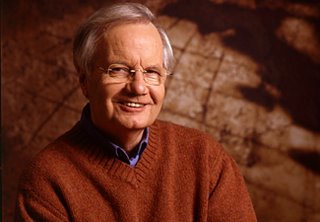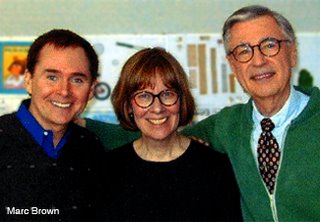
I called Bill Moyers today.
I've been a fan of his since watching his groundbreaking interviews with Joseph Campbell, "The Power of Myth," in college. Anyone who can connect the dots between "Star Wars" and Odysseus, between modernity and myth, is good with me.
Moyers studied journalism at North Texas University. He interned for Senator Lyndon Baines Johnson, and, when LBJ took office after JFK's assisination, acted as his special assistant. He was an International Fellow at University of Edinburgh, and received a Bachelor of Divinity degree from Southwestern Baptist Theological Seminary in Fort Worth. He was ordained two years later. He's been working journalist at PBS since 1971, hosting "Now," "Bill Moyers Reports," and "Faith & Reason," amongst others. He has received 30 Emmy awards over the course of his 25 year career, including a Lifetime Emmy Award in September.
As I pointed our rented Taurus down Bo Lozoff's driveway, I turned to Chris and said, "We have to get Bill Moyers." Bo had staggered us with his explanation of "deep and simple," its foundation in the world's great religions, and its inherent opposition to our modern, accelrated culture. If anyone could help us make sense of faith and God and sex and children's prgramming, it was Bill Moyers.
Well, his assistant, Karen, wasn't quite sold. "He's in production and not making any further committments," she said. "And he told me he didn't know Mister Rogers that well anyway."
That Chris and I aren't endeavoring to make a film about Mister Rogers, per se, is the challenge of this entire undertaking. In exploring what is "deep and simple," we are hiking a trail blazed by Mister Rogers, yes. But we're not making a biography. We're exploring the man, and what he stood for, and why we need it now more than ever. Hence our interest in Bill Moyers.
"If you just give me a second to explain," I said.
"Actually, I have three people one hold. Why don't you email me." So I did.
In short, Fred Rogers really was my neighbor. In conversation, Fred (a sage, public television icon) and I (a young, idealistic MTV News producer) constantly explored his belief that -- in life, and on television -- "deep and simple is for more essential than shallow and complex." The summer prior to his death, he urged me to "spread the message," which I am endeavoring to do via my documentary, "Mister Rogers & Me."
Much of Mister Rogers' "deep and simple" ethos -- a phrase he plucked from author/activist/mystic (and friend) Bo Lozoff's book, "Deep & Simple" -- was based on his unique perspective a Presbyterian minister, and as a participant, observer and activist within our accelerated media culture. Thus far, we've interviewed Susan Stamberg, Tim Russert, Marc Brown, and Mr. Lozoff to that end.
My co-director (and brother) and I interviewed Mr. Lozoff at his North Carolina commune. He (and his devotees) live by three tenants derived from world religions: live simply (wary of material), contribute to the greater good, and practice spirituality daily. These were Fred's core values as well. And these, as it ends up, fly in the face of contemporary values: we have more things but less satisfaction; we have more need for altruism, but less engagement; and we have more distraction, and less tranquility. And so, as we drove away from Mr. Lozoff's commune, I said to my brother, "We need Bill Moyers to help us make sense of all this."
Whether through his work with Joseph Campbell, immediately after September 11, or "Faith & Reason," Mr. Moyers has been a constant source of insight and inspiration in at the intersection between the gravitas of spirituality, and the frivolity of an accelerated culture. To that end, we seek Mr. Moyers answers to questions such as: "Has American culture become shallow and complex?" "How does media and consumer culture conspire against depth and simplicity?" And "To whom does culture look for deep and simple inspiration?"
Our request, then, is for just twenty minutes of Mr. Moyers time. We are a small, nimble, enthused crew of two shooting HDDV with a small light kit. We will be in and out in under an hour. And we will be so grateful for the wisdom and insight that only Mr. Moyers can provide; there is no one else as deep, or who communicates with such clarity, and simplicity.
It's a complicated transition: from Fred Rogers, to "deep and simple," to the basic tenants of world religions, to contemporary culture. Fred explained it to me in one sentence. But, according to Chris (who has been making select reels of all of our interviews), it took me six minutes to explain to Marc Brown.
So... that's the latest. I also have letters into Teresa Heinz Kerry (who also summers on Nantucket, and sits on the Family Communications board), and Linda Ellerbee (who's "Nick News" is the longest running children's news program on television). That ought to get us into 2007. Then it's off to Pittsburgh, back to Nantucket, and onward to the big screen...






